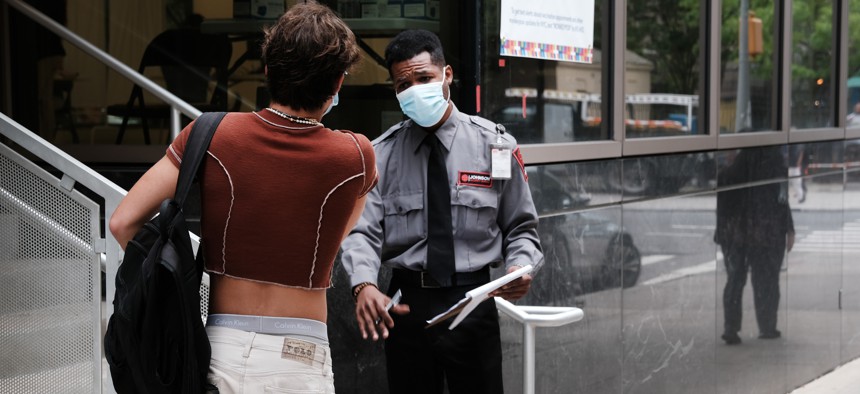Healthcare
New York City’s IT czar answers to monkeypox website failures
“We have learned from our mistakes and we are committed to doing better going forward,” a health department official said.

A security guard speaks to people at a health care facility that is administering the monkeypox vaccine by appointment earlier this month in New York City. (Photo by Spencer Platt/Getty Images)
When New York City Mayor Eric Adams announced a reorganizing of the city’s technology-related offices and agencies at the beginning of his term, he said the overhaul would, in part, “improve the delivery of government services.” But New Yorkers attempting to access monkeypox vaccine appointments last month were met with déjà vu in the form of websites that failed under demand.
It was those failures of monkeypox vaccination sign-up websites from outside vendors – as well as problems with other digitally delivered city services, including the Housing Connect website – that prompted City Council Technology Committee Chair Jennifer Gutiérrez to hold an oversight hearing on Wednesday examining the “failures of New York City's technological response under critical demand.” “As our city continues to invest millions of dollars in the digital transformation of our programs and services, we cannot allow the mistakes of our past to appear again in our future,” Gutiérrez said Wednesday.
As Gutiérrez and Council Member Erik Bottcher questioned administration officials on what went wrong with the deployment of the online tools used to schedule appointments for monkeypox vaccines, Matt Fraser, who heads the new umbrella Office of Technology and Innovation, drew a thick line between the previous and current administration, underlining OTI’s focus on improving oversight and deployment of tech services going forward – not so much remedying existing tech contracts from the previous administration.
The city’s contracts with MedRite and Affiliated Physicians – the providers who managed the first two monkeypox sites – are from 2021 and 2020, respectively. “OTI is the city’s tech authority and not the city’s medical authority,” Fraser said. “This vendor had been previously cleared by another administration. Our look at this is that it's a vendor that's done similar work in the city for this purpose, and unfortunately, it did not work out this time.”
Dr. Torian Easterling, the first deputy commissioner and chief equity officer at the city’s Department of Health, said that MedRite and Affiliated Physicians were both chosen as providers because they were already doing similar vaccine work for the city, including vaccination campaigns in schools and in homes. “This isn't a vendor that really focuses on scheduling capabilities, and so this was something that we did ask them to do,” Easterling said of MedRite, the first vendor tapped to set up the city’s monkeypox vaccine scheduling. Easterling alluded that while the department did some testing with the vendors, more could be done in the future. “We’ve learned from our errors,” he said.
Following the crashes of both the MedRite and then the Affiliated Physicians sites, the city now relies on its existing Vax4NYC website used for COVID-19 vaccines for online scheduling of monkeypox vaccine appointments. In setting up that additional functionality for the Vax4NYC site, OTI performed its own testing of the site. “Because we were able to do an adequate amount of testing, the site has not run into significant problems since it was deployed,” Fraser said of the Vax4NYC site.
Fraser said that OTI will be more directly involved in similar deployments in the future, including taking part in testing. “Going forward, all initiatives that are of this size and scale will be done in partnering with our agencies, but under the guidance of the Office of Tech and Innovation,” he said.
But according to Fraser, that level of involvement from OTI will apply to new contracts going forward, not old ones like MedRite and Affiliated Physicians. “I think it’s important that it’s emphasized on the record, because for me, this would be an example of where OTI could have played more of a role in the vendor selection process and the contract process, but that’s not what happened,” Gutiérrez said of the earlier monkeypox website failures.
So far, monkeypox infections have largely been concentrated among men who have sex with men, though it can spread to anyone through close contact. Bottcher, who represents a large gay community in the City Council, said that the experience of his constituents in struggling to sign up for a monkeypox vaccine left a bad impression of the city’s ability to provide crucial services. “It's more than just not being able to get a vaccine that day. It really erodes trust in the whole system,” Bottcher said. “I really want to make sure that we learn every possible lesson that can be learned to make sure that this never happens again.”
Fraser said that OTI is learning from the previous experiences of New York City’s technology failures in launching MyCity – a pet project of the mayor that aims to eventually serve as a one-stop-shop portal for city services and benefits. It will start off with managing child care enrollment though. Fraser said the project is in the “user acceptance testing” phase ahead of an initial fall launch.
Not unlike his boss, Fraser appeared focused on helping the city turn a new leaf, rather than looking back at the city’s previous failures. When Council Member Gale Brewer expressed some doubt that MyCity would come to fruition – having served through some technological swings and misses under both Michael Bloomberg and Bill de Blasio – Fraser sought to assure her. “Luckily, both the mayor and I are in the business of making those that don’t believe into believers,” Fraser said.
“Uh huh,” Brewer replied. “And I’ll sell you the Brooklyn Bridge.”
